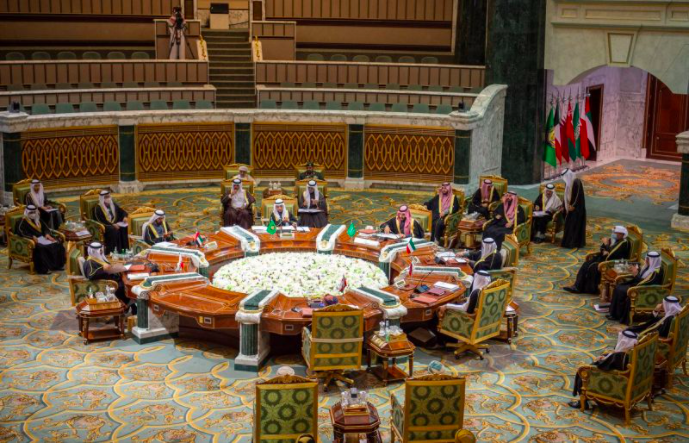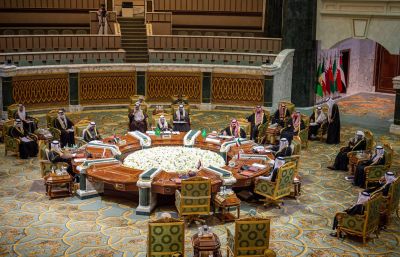
The Gulf Cooperation Council summit on December 14 in Jeddah. (Credit: Bandar al-Jaloud/AFP)
For Saudi Arabia, Lebanon has returned to relevancy.
While most observers were not very optimistic about the potential impact of the meeting between French President Emmanuel Macron and Saudi Crown Prince Mohammad bin Salman that took place in Jeddah on Dec. 4, it appears that the visit was enough to convince the Saudis to give diplomacy with Lebanon one more try, but under specific conditions and without adopting a less aggressive policy vis-à-vis Hezbollah.
“Macron’s visit did the trick,” a French diplomat said on condition of anonymity.
During the meeting, Macron was allegedly successful in impressing upon his interlocutor the need to prevent the total collapse of Lebanon, arguing that this could have repercussions on the Gulf.
Saudi Arabia has been betting in recent months that the deteriorating situation in the country would weaken Hezbollah’s position and prompt the rest of the Lebanese population to turn against it.
It seems, however, that the kingdom has miscalculated, and the Shiite party does better than other stakeholders in times of crisis, and that Riyadh’s withdrawal from the Lebanese scene has only played to Hezbollah’s favor.
From corroborating sources, L’Orient-Le Jour learned that Macron has failed to snatch a promise from MBS of direct aid to Lebanon’s security forces and the army, the stability of which is a priority for the West.
Saudi Arabia remains cautious and is not ready to reinvest in the land of the cedars without first having reversed the balance of power, but is inclined toward the argument being made by France and other countries that are pushing in the same direction.
Shortly before Marcon’s visit, a meeting was organized between officials from the British Embassy in Beirut and Saudi officials in a bid to convince the Saudis to change their stance on Lebanon.
“You have many allies in Lebanon, they must be supported, not abandoned,” this was the main point of British diplomats to their Saudi counterparts, according to corroborating sources who attended the meeting.
This was followed by a meeting between the Saudi Ambassador to Lebanon, Walid Bukhari, and the British ambassador to Saudi Arabia. The two men agreed on the need to refocus on the Lebanese dossier.
Bukhari returned to Riyadh in the fallout of the diplomatic row and almost severed ties with Lebanon on Oct. 29.
Riyadh is particularly concerned that its neglect of Lebanon would allow Hezbollah to make a breakthrough in the ranks of the Sunni community, which, although overwhelmingly hostile to the Shiite party, could find itself without assertive leadership if the Future Movement head, Saad Hariri, decides not to toss his hat in the 2022 legislative elections.
The Saudis appear to be planning to tackle this issue with several Sunni officials as well as their allies in the Lebanese arena.
Riyadh recently received Melhem Riachi (Lebanese Forces) and Wael Abu Faour (Progressive Socialist Party) in a meeting that seemed to reflect the kingdom’s desire to lay the foundations of its strategy in Lebanon.
Further invitations to meet may be extended to Sunni, Christian and even independent Shiite figures, according to a Saudi diplomatic source.
Meeting Cairo halfway
It is in this same vein that Saudi Arabia is striving to build a unified diplomatic front with other Arab countries on the Lebanese issue.
At the Gulf Cooperation Summit held in Jeddah on Dec. 14, Riyadh rallied all other members around its vision on this matter.
The summit’s final statement on the issue insisted on respect for sovereignty, while designating Hezbollah as a terrorist organization guilty of destabilizing the Arab countries’ security and stability.
Not only has MBS managed to lead Qatar and Oman in this direction — while both countries maintain less hostile relations with Iran, Hezbollah’s political patron — the statement clearly stressed that any aggression against one of the Gulf States is considered an attack against all.
In addition to the countries of the Arabian Peninsula, Saudi Arabia is seeking support from Egypt.
Egyptian Foreign Minister Sameh Shoukry visited Riyadh on Dec. 12.
“Lebanon was on the agenda” during the meeting, an Arab diplomat told L’Orient-Le Jour on condition of anonymity.
Taking advantage of Saudi Arabia’s withdrawal from the Lebanese arena, Egypt has been trying in recent months to position itself as the new patron of the country’s Sunni community.
Cairo has, until now, held a much less confrontational policy than Riyadh. It has agreed to supply gas to Lebanon via Syria, whose President Bashar al-Assad is an ally of Hezbollah.
Despite its animosity toward Iran, Egypt has not made the nation its main enemy in the Middle East, and seems to prioritize preventing Lebanon’s institutions from collapsing, notably the army.
It appears, however, that Cairo and Riyadh have recently converged their positions.
“Egypt is ready to intensify its coordination with Saudi Arabia on the Iranian issue, and more particularly when it comes to Lebanon,” the aforementioned Arab diplomat said.
The two countries seem to be meeting halfway: Riyad agrees to reinvest in Lebanon on condition of elevating in priority the subject of Hezbollah.
For Saudi Arabia, Egypt’s support is significant both symbolically and diplomatically, especially in the spirit of moving Damascus away from Tehran when it comes to Lebanon, if Syria were tempted to reinvest in Lebanon.
“Saudi Arabia wants to be more present in Lebanon, but for that it needs the support of other stakeholders,” a Gulf official said.
According to him, Riyadh will now coordinate its actions with Paris and Cairo before determining its next steps, and meanwhile, the kingdom is likely not to let another Gulf country take its place in Lebanon.
This article was originally published in French in L'Orient-Le Jour. Translation by Sahar Ghoussoub.
